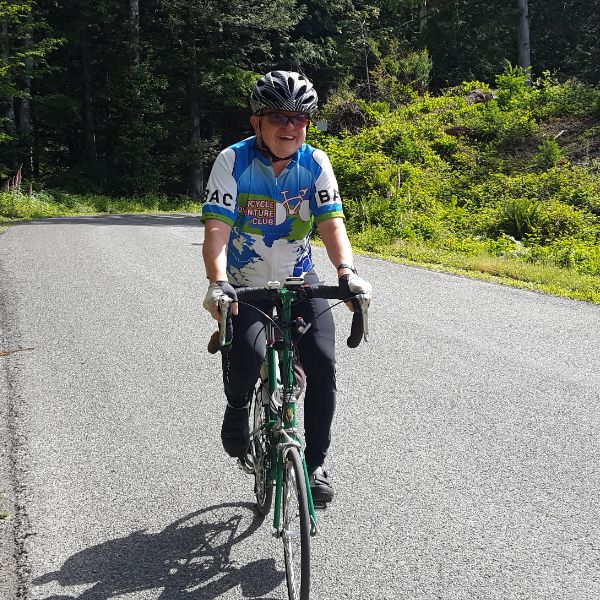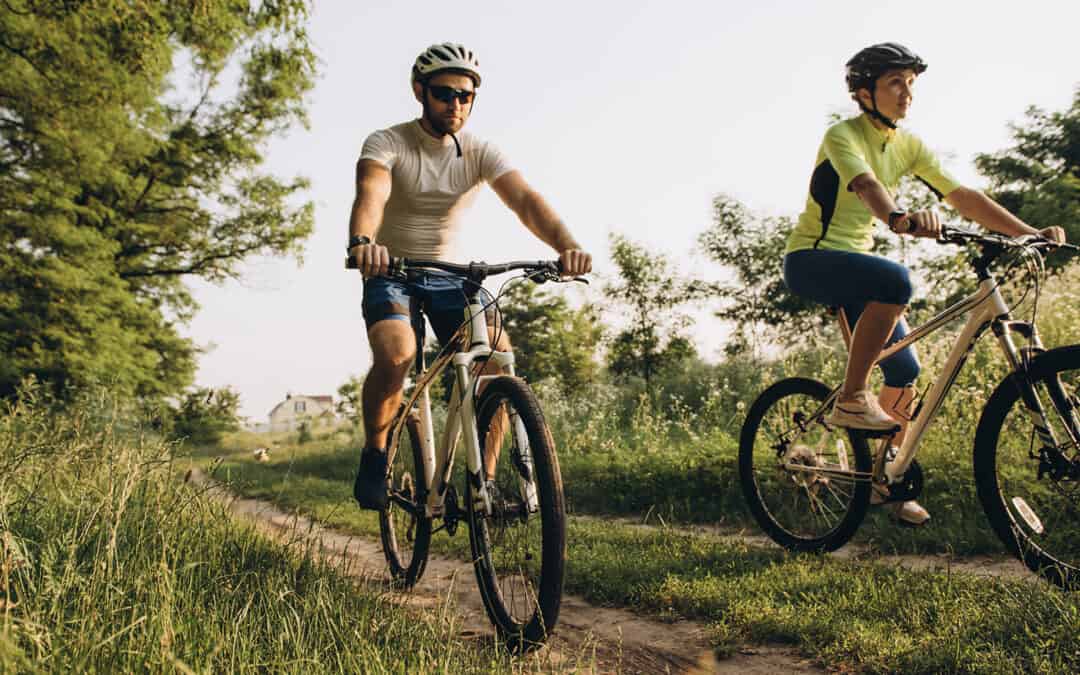Group Rides and Bicycle Safety
An interview with Dan Harrison

To help do this, we’re starting a series of safety discussions on our blog. This first post is from a conversation with Dan Harrison, who is a Ride Captain with the Ann Arbor Bicycle Touring Society.
We ride bikes for many reasons. There are great sights available on tours or on Saturday bike rides, health benefits from cycling, and the fun you have on the bike with your friends. These are wonderful things, but they’re best available AFTER you’ve designed some safety into your riding experience. To learn more about planning for safe rides, I talked with Dan Harrison, a Ride Captain and former officer of the Ann Arbor Bicycle Touring Society (AABTS).
Like many of us, Dan has ridden his whole life, from going round and round the dining room on a tricycle, to his first real bike, a red & white Murray, and on to become someone who rides 3,000 miles a year in retirement.
His adult cycling started in the mid 1970’s. “I remember I was working in Detroit then, and I bought my first nice real road bike. At about the same time there was Bike Centennial; that’s where many of the adults who ride today first got into cycling.”
Fast forward to 1988 and his future wife Jan. With several thousand miles under her belt, she got him to join the AABTS, and he became an officer of the club in 1989, responsible for 30 years of potluck meals. He also became a ride leader about that time.
Ride Leader Qualifications
A group like the AABTS is focused on getting people on bikes, through bike advocacy programs, regular group rides, and involvement in the community. I asked Dan about his qualifications to be a ride leader, aside from having a pulse and owning a bike. His reply: “One, I was good at routes and knowing what were good bicycle routes. I was real good at maps, and this was before we had smartphones or personal computers. The only thing we had back then, the City of Ann Arbor had a part-time bicycle coordinator, and they had a bicycle map of the city. Of course we wanted to get out into the county, so we’d buy good county maps and work off those.”
Does the AABTS provide safety guidelines for Ride Captains?
“Yes, we do. We have a chair of the safety committee. On our website there is a ‘Rules of the Road’ page full of safety guidelines. Also there’s a 4 or 5 page post, Tips for Ride Captains, with general safety and how to run a ride.”
There’s more. The AABTS “offered the Effective Cycling Courses about 15 years ago, probably 3 times with 20 to 30 people each time. It also included Red Cross first aid training. I’ve also been a member of the Bicycle Adventure Club, and I’ve arranged some of the ride leader seminars for that club. For 4 years I’ve discussed safety there for 20 to 40 people.”
Safety on a Group Ride
So far we have mapping skills, bicycle safety and first aid training, and teaching skills from sharing safety knowledge with other tour leaders. But how is this information put to practice on regular club rides?
“The first thing is to pick really good routes which are safe. The second is to talk to new people (on the ride) about how to be safe on the bike. When riding, I’ll also nicely give people safety tips. On our Friday ride, there’s a mix of road and paved trail, and you have to slow down on the trail! Your road bike is a sports car compared to family bikers or walker. Cyclists need to be friendly and courteous. “
“One other point, a bicycle is very quiet on the trails. You can come upon a walker and they are shocked sometimes, they don’t anticipate quiet bicycles! So a tip for bicyclers, make sure you’re vocal, so the walkers know in advance that you’re passing them.”
Why be a ride leader?
After 30 years of leading rides, I find it remarkable that Dan is still a ride leader. I asked him, after all this time, what could be the motivation to continue?
“You know, not everyone is suited to be a leader. Many folks are very good riders, but they don’t have the social skills or leadership skills. You lead by example. I’m motivated do it, though, because I like riding with groups.”
It’s not just biking in groups, though. Dan’s level of engagement continues at a personal level.
“I really enjoy new folks who come out to ride, and I’ll spend time talking with them, telling about the club, places to ride, what to anticipate, safety and nutrition. But as a conversation, not a speech.”
Safety is a big subject
Our interview on safety covered many topics including bike clothing and rearview mirrors, electronic navigation, cue sheets, the Idaho stop, gravel riding, and recruiting new cyclists. We could have gone for hours talking about safety.
My take-away from this conversation can be distilled to a few points. First, plan your route before you go out. There are many good navigation planning aids available at no cost (drop me an email if you need a list). Next, if you’re riding with a group, be sure you’ve set expectations on rider behavior, and don’t be afraid to discuss safety when you’re out riding. Finally, be courteous and be sure to communicate with those around you.
Want to read more? Please check out the Ride SMART page from the Cascade Cycle Club, and the Ann Arbor Bicycle Touring Society Safety Guidelines. If that’s not enough, take a look at the full transcript of my Interview with Dan Harrison .
Looking for a tour? See some great ones right here!
Ride Safe, my friends!

